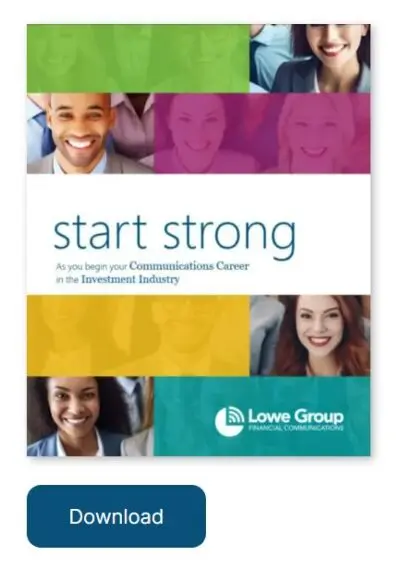
Welcome to the investment industry, grads!
It’s that time of year—when LinkedIn is overridden with group photos of the bright and shiny faces of the incoming classes of new employees and interns fortunate enough to be starting their careers in the investment management industry.
 If you’re a manager responsible for onboarding new communications professionals, it all falls on you to assure the newcomers get off to a strong start: Scheduling the introduction meetings, assigning mentors, identifying just the right first assignment, and making time for all those questions (and you want those questions!).
If you’re a manager responsible for onboarding new communications professionals, it all falls on you to assure the newcomers get off to a strong start: Scheduling the introduction meetings, assigning mentors, identifying just the right first assignment, and making time for all those questions (and you want those questions!).
Let us help, at least in some small way: Here’s a collection of advice and recommended practices for newcomers in public relations, content marketing, digital marketing, and media relations roles at investment firms.
We know what the newbies are walking into and we do our best to help guide them on the correct path. For example:
- Always say, “Sure, I can try that,” counsels Lowe Group Founder & President Jody Lowe.
- “Never try to sound smart. Don’t rely on jargon,” says Principal & Managing Director Benjamin Bishop.
- “Be serious with the analytics,” says Head of LG Digital Pat Allen. “Build a personal brand that people will have faith in.”
- “Nothing beats a face-to-face,” says Media Relations Principal & Executive Vice President Greg Joslyn.
- “Be flexible, you’re going to need to adapt to survive” is the wisdom from our early career Client Services team members Talia Dunyak, Elizabeth Terry and Ella Lawrence, themselves just a few years out of school.
There’s no substitute for experience, but our tips can have your back in orienting your new hires. Download our guide to ease their transition.
Need something more? Lowe Group offers workshops in all three disciplines: PR, digital marketing and content marketing. Send us an email and we’ll be happy to share the details, including the ability to customize the agenda.
Subscribe.
Receive the latest news and insights from Lowe Group.